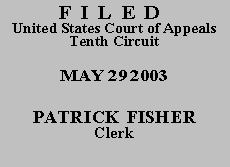

| UNITED STATES OF AMERICA,
Plaintiff - Appellee, v. PETER WAYNE MCNUTT, Defendant - Appellant. |
|
Defendant Peter Wayne McNutt appeals from the order entered by the district court revoking his term of supervised release and imposing a two-year prison term. We exercise jurisdiction under 28 U.S.C. § 1291 and affirm.
In November 1994, McNutt was sentenced to ninety-six months' imprisonment to be followed by a three-year term of supervised release for possessing an unregistered firearm. McNutt served his prison sentence, and his term of supervised release began in March 2001. In September 2002, the government filed a petition to revoke McNutt's term of supervised release, alleging that McNutt had violated the terms of his supervised release by committing an assault with a dangerous weapon in violation of Okla. Stat. Ann. tit. 21, § 645 (1999). A revocation hearing was held before the district court in October 2002. At the conclusion of the hearing, the court found that McNutt had violated the terms of his supervised release by committing an assault with a dangerous weapon in violation of Oklahoma law. The court therefore revoked his term of supervised release and sentenced him to a two-year prison term.
To revoke a term of supervised release, the district court must find by a preponderance of the evidence that the defendant violated a condition of his release. 18 U.S.C. § 3583(e)(3); United States v. Disney, 253 F.3d 1211, 1213 (10th Cir. 2001). As the trier of fact in a revocation proceeding, the district court has the exclusive function of appraising the credibility of the witnesses, determining the weight to be given their testimony, and resolving any conflicts in the evidence. United States v. Leach, 749 F.2d 592, 600 (10th Cir. 1984). We review a district court's decision to revoke a term of supervised release for an abuse of discretion, and the district court's factual findings for clear error. Disney, 253 F.3d at 1213; United States v. Hall, 984 F.2d 387, 390 (10th Cir. 1993).
McNutt raises only two issues in this appeal. First, he asserts that the government presented insufficient evidence at the revocation hearing to establish that he had the requisite mens rea to commit an intentional assault with a dangerous weapon in violation of Oklahoma law. Second, he asserts that, even if the government presented sufficient evidence that he committed an intentional assault with a dangerous weapon, he was justified in committing the assault under what is commonly known as Oklahoma's "Make My Day" statute, see Okla. Stat. Ann. tit. 21, § 1289.25(B) (1995), because he reasonably believed that Jeremy Barber, the victim of the assault, had unlawfully entered his dwelling as an intruder and that Barber might use physical force against him or his daughter.
In order to prevail on either of these issues, McNutt must establish that the district court's revocation order is based on clearly erroneous factual findings. Hall, 984 F.2d at 390. Having reviewed the testimony and evidence presented at the revocation hearing, we conclude that the district court's finding that McNutt intentionally assaulted Barber with a dangerous weapon in violation of Oklahoma law was supported by a preponderance of the evidence, and that McNutt has failed to establish that any of the district court's factual findings were clearly erroneous. Specifically, the evidence put forth by the government at the revocation hearing established that McNutt admitted to the police officer who responded to the scene that he had poked Barber in the buttock with a hunting knife while escorting Barber out of his residence at knife point, and McNutt's admission was corroborated by Barber's testimony at the hearing and by physical evidence observed at the scene by the police officer. Further, there was insufficient evidence presented at the revocation hearing for the district court to conclude that McNutt was justified in using physical force against Barber under Oklahoma's "Make My Day" statute. The statute requires an unlawful entry into a dwelling, see State v. Anderson, 972 P.2d 32, 35 (Okla. Crim. App. 1998), and the uncontroverted testimony at the hearing established that Barber had entered McNutt's dwelling with the consent of his daughter.
The order of the United States District Court for the Western District of Oklahoma is AFFIRMED.
Entered for the Court
Circuit Judge
*. This order and judgment is not binding precedent, except under the doctrines of law of the case, res judicata, and collateral estoppel. The court generally disfavors the citation of orders and judgments; nevertheless, an order and judgment may be cited under the terms and conditions of 10th Cir. R. 36.3.